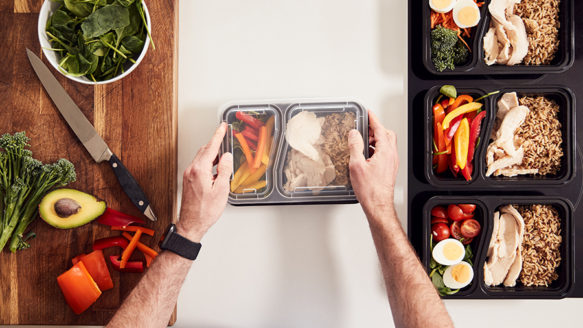
The Money-Saving Super List
Many people are feeling the financial squeeze in these tough economic times. The rising cost of living can make it seem nearly impossible to save money while still having a good quality of life. According to a recent poll, more than half of Albertans said it’s been difficult to meet their monthly household expenses. At Money Mentors, we understand these struggles and are here to help.
Our Stretch Your Dollars workbook has long been a favourite of both our clients and counsellors. It offers practical tips and strategies to make your money go further. Whether you’re trying to save on groceries, housing, or even recreational activities, this workbook is a treasure trove of useful information.
However, as we move to an increasingly paper-free world, we decided to take some of the best advice from the workbook and turn it into a money-saving super list blog post organized into easy-to-follow sections.
Let’s explore these strategies together and find new ways to save money, leaving you with more to spend on the things that really matter to you.
In this article, we’re going to cover:
Save Money on Food
Save Money on Housing
Save Money on Laundry
Save Money on Furniture and Appliances
Save Money on Utilities
Save Money on Telephone, TV, and Internet
Save Money on Child Care and Education
Save Money on Clothing and Footwear
Save Money on Personal Allowances and Gifts
Save Money on Recreation
Save Money on Transportation
Save Money on Insurance and Medical
Save Money on Food

For many households, food represents one of the largest monthly expenses. Yet, it is an essential part of our daily lives, providing the nutrition and energy we need to thrive. The good news is that with a little bit of planning and mindful shopping, you can cut back your grocery bills without losing out on the quality or nutrition of your meals.
Let’s explore some practical tips that will help you make the most out of every dollar you spend on food.
Food Money-Saving Tips:
- Substitute expensive items: Refer to Eating Well With Canada’s Food Guide for healthy, budget-friendly substitutes like peanut butter and beans instead of meat.
- Alternate milk types: Alternate between fresh milk and skimmed milk powder to save costs without losing nutritional value.
- Plan your meals: Try to plan your meals for a week and shop just once a week to avoid impulsive purchases.
- Avoid shopping when hungry: Never shop when you’re hungry to prevent buying unnecessary items.
- Stick to a list: Make a list of what you need and stick to it to avoid buying extra items.
- Choose sale and seasonal goods: Select goods that are on sale or in season for the best prices.
- Buy tougher cuts of meat: Purchase tougher cuts of meat and make them delicious by marinating, tenderizing, or slow-cooking.
- Buy in bulk: Buy non-perishables like rice and pasta in bulk from warehouse stores for better value.
- Use coupons and rebates: Use coupons, rebates, and frequent shopper programs wisely to ensure you only buy items you truly need.
- Compare prices: Compare prices between store brands, name brands, and no-name brands to get the best deals.
- Be aware of marketing strategies: Avoid impulse buys by being aware of marketing strategies such as item placements.
- Check discount bins: Always check discount bins for marked-down items.
- Watch the cash register: Pay attention to the scanner at the cash register to catch any pricing errors.
- Bring store flyers: Carry store flyers to confirm prices and see if stores will match competitors’ prices.
- Join a collective kitchen: Participate in a collective kitchen to budget, plan, shop, and prepare meals with others, reducing costs.
- Cook at home: Cook at home more often to save on dining out expenses.
- Start a food-buying co-op: Join forces with other families to buy food in bulk at a volume discount.
- Start a community garden: Engage in a community garden to grow and share fresh produce with neighbours.
- Inventory before shopping: Before making your list or going to the store, open your freezer and make an inventory of the meat you have, then open your pantry and make meal ideas with the ingredients you already have. Write your list for only the missing items to complete those meals. This helps avoid freezer-burned meat, buying stuff you already have, and saves money.
Save Money on Housing

Housing is often the single largest expense in most budgets, whether you’re renting an apartment or paying off a mortgage on a home. The costs of keeping a roof over your head can quickly add up, leaving little room for other necessities. However, there are a few things you can do to reduce these costs and make the most of your living space.
Let’s look at some practical tips that will help you save money on housing and make your home more cost-efficient.
Housing Money-Saving Tips:
- Negotiate rent reduction: If renting, ask if you can reduce your rent by doing odd jobs around your building or consider relocating.
- Rent out space: If you own a house, rent out your garage or a spare room to generate additional income.
- DIY maintenance: Learn to do simple maintenance repairs yourself by attending workshops or helping knowledgeable friends with their home improvement projects.
Save Money on Laundry

Laundry can be a surprisingly significant expense when you factor in the cost of detergent, fabric softeners, water, and electricity. However, with a few small changes to your routine, you can reduce these costs.
Let’s explore some practical tips that can help you cut down on laundry expenses and make your laundry routine more efficient and cost-effective.
Laundry Money-Saving Tips:
- Homemade fabric softener: Use a large no-name bottle of liquid fabric softener and add a couple of teaspoons to a washcloth in the dryer to reduce static and soften fabrics.
- Use starch on sneakers: Spray new and freshly washed sneakers with starch to keep them cleaner for longer.
Save Money on Furniture and Appliances

Furnishing a home and making sure it has all the right appliances can quickly become very expensive. However, there are plenty of alternative ways to acquire these items without breaking the bank.
Let’s look at some savvy strategies to help you furnish your home stylishly and practically while keeping expenses in check.
Furniture and Appliances Money-Saving Tips:
- Trade unused furniture: Trade furniture you don’t use with others who might need it.
- Shop second-hand: Buy items from second-hand stores for great deals on gently used furniture and appliances.
- Read rent-to-own agreements: If considering rent-to-own furniture, read the fine print to understand all costs involved.
- Pay off buy-now, pay-later: If using “buy-now, pay-later” promotions, make all payments in full before the interest-free period ends to avoid high-interest charges.
Save Money on Utilities

Reducing utility bills is one of the most straightforward and impactful ways to save money. With the rising costs of electricity, natural gas, and water, small adjustments in how you use these resources can lead to significant savings over time.
Let’s explore some effective ways to reduce your utility bills and enhance your household’s efficiency.
Electricity and Natural Gas Money-Saving Tips:
- Turn off lights: Turn off lights when not in use to save on electricity.
- Adjust thermostat and water tank: Turn down your thermostat and water tank when they’re not needed.
- Use energy-efficient bulbs: Replace 100-watt bulbs with energy-efficient alternatives like halogen or LED bulbs.
- Check appliance seals: Ensure seals on your oven, fridge, and freezer are tight to prevent energy loss.
- Optimal temperatures: Set hot water tanks, refrigerators, and freezers to optimal temperatures for efficiency.
- Clean furnace filters: Regularly clean furnace filters to maintain efficient operation.
- Minimize space heater use: Reduce the use of electric space heaters to save on energy bills.
- Move furniture away from heaters: Ensure furniture is at least 30 centimeters away from heaters and registers for better heat flow.
- Close drapes in winter: Close the drapes as soon as the sun goes down in the winter to keep warm air inside.
- Use portable fans in summer: Use small portable fans to stay cool in the summer.
- Use door socks: Use “door socks” to stop drafts under doors and keep your home insulated.
- Use timers: Use indoor appliance timers to turn lights on and off, and outdoor timers for vehicle block heaters to save on energy.
Water Money-Saving Tips:
- Rinse dishes efficiently: Rinse dishes in a drainer and pour a bowl of water over them instead of rinsing under running water.
- Run full dishwasher loads: Use the shortest wash cycle possible, utilize the air dry cycle, and run only full loads in the dishwasher.
- Fix leaks: Regularly check and repair leaks in toilets, pipes, and faucets.
- Install low-flow devices: Install low-flow showerheads and flow-reducing devices on taps to save water.
Save Money on Telephone, TV, and Internet

Telephone, TV, and internet bills can account for a significant portion of your monthly expenses. With so many options and packages available, it’s easy to end up paying for services you don’t really need or use. By taking the time to evaluate your current usage and identifying areas where you can cut back, you can save a substantial amount of money each month.
Let’s explore some practical tips to help you manage and lower these expenses effectively.
Telephone, TV, and Internet Money-Saving Tips:
- Cancel unused services: Cancel services or features you don’t use.
- Switch providers: Reduce long-distance charges by switching to a different service provider.
- Pre-purchase cellphone time: Cut back on or pre-purchase cellphone time to manage costs.
- Cancel your landline: If you primarily use your cell phone, consider cancelling your landline.
Save Money on Child Care and Education

Childcare and education expenses can significantly strain a family budget, often leaving parents searching for ways to make ends meet. However, numerous cost-saving options and cooperative solutions can help alleviate this financial burden. By exploring alternatives such as childcare co-ops, subsidized programs, and creative exchange services, families can find affordable and effective ways to support their children’s growth and learning. Let’s delve into some practical tips and strategies to help manage and reduce the costs associated with child care and education.
Child Care Money-Saving Tips:
- Create a child care co-op: Form a child care co-op with friends and neighbours to share child care duties and reduce costs.
- Offer services in exchange: Provide services like repairs or meals in exchange for reduced childcare costs.
- Look into subsidized daycare: Explore options for subsidized daycare programs.
Education Money-Saving Tips:
- Fee waivers: Look into fee waivers for low-income families with children in K–12.
- Volunteer for credit: Ask about volunteering in exchange for credit toward school expenses.
- Research loans and grants: Explore government student loans and grants for post-secondary education.
Save Money on Clothing and Footwear

Clothing and footwear costs can add up quickly, especially for growing children and fashion-conscious adults. However, with some smart shopping strategies and a bit of creativity, you can keep your wardrobe updated without breaking the bank.
Let’s explore some practical tips to help you dress well while staying within your budget.
Clothing and Footwear Money-Saving Tips:
- Shop during sales: Buy clothing during sales or at second-hand stores for great deals.
- Trade clothes: Trade clothes with friends and neighbours and establish an annual clothing swap event, especially for children’s clothing.
- Thrift: There is a thriving thrifting community across Canada at the moment. Find great deals at your local thrift store.
Save Money on Personal Allowances and Gifts

Managing personal allowances and gift expenses requires a blend of discipline and creativity. It can be easy to overspend on impulse purchases or special occasions, but with thoughtful planning and a few smart strategies, you can keep these costs under control.
Let’s explore some practical tips to help you manage personal allowances and gift expenses effectively.
Personal Allowances Money-Saving Tips:
- Avoid impulse purchases: Try to resist impulse purchases by giving yourself time to think.
- Carry pocket change: Carry only pocket change for small items to limit spending.
- Set allowances for children: Establish reasonable allowances for children.
- Know return policies: Understand return policies for items you purchase to avoid unnecessary expenses.
Gifts Money-Saving Tips:
- Make homemade gifts: Create homemade gifts or give a gift of time or services.
- Set price ranges: Set a realistic price range for gift exchanges with friends and family.
- Save monthly for gifts: Set aside money each month for gifts to manage special occasions better.
- Make your own cards: Create cards instead of buying them and involve your kids.
- Pool gift money: Combine gift money with friends or family for a more substantial present.
- Use free gifts: Set aside free gifts received with other purchases for future use.
- Take advantage of sales: Buy gifts during sales to save money.
Save Money on Recreation

Enjoying recreational activities doesn’t have to break the bank. There are plenty of low-cost options for fun and entertainment that allow you to enjoy quality time with family and friends without straining your budget.
Let’s look at some practical tips and ideas to help you make the most of your leisure time while keeping costs down.
Recreation Money-Saving Tips:
- Take local vacations: Opt for local vacations instead of expensive trips.
- Buy used equipment: Purchase used sports equipment to save money.
- Look for community programs: Participate in community-run recreational programs and seek out discounts for low-income families.
- Enjoy public parks: Take advantage of public parks for free or low-cost outdoor activities.
- Free or low-cost fun: Engage in activities like walking or jogging in parks, building a snowman, going skating, tobogganing, cross-country skiing, or snowshoeing. Borrow books from the library, form a book club, use the Internet at your local library, visit museums, art exhibits, science centers, attend school or university sporting events, visit with friends and family, play board games, use your local community pool, and buy second-hand sporting equipment.
Save Money on Transportation

Transportation costs can quickly add up, but they can be reduced through careful planning and regular maintenance. Whether you’re driving your own vehicle or using public transit, there are numerous ways to cut down on expenses.
Let’s explore some practical tips to help you manage and reduce your transportation costs effectively.
Transportation Money-Saving Tips:
- Carpool: Share rides with friends or neighbours who have similar schedules and destinations.
- Barter for maintenance: Offer services or goods in exchange for car maintenance and repairs.
- Drive responsibly: Practice safe driving habits to avoid tickets and reduce insurance premiums.
- Use public transit: Save money by purchasing a collection of tickets or monthly passes for public transit.
Save Money on Insurance and Medical

Insurance and medical expenses can be a significant part of your budget, but with careful management, you can reduce these costs without sacrificing necessary coverage. Choosing the right insurance policies and being proactive about cost-saving opportunities can make a big difference.
Let’s explore some practical tips to help you navigate insurance and medical costs more effectively.
Insurance Money-Saving Tips:
- Review coverage: Make sure you’re not paying for unnecessary insurance coverage.
- Choose the right insurance: Research and select the right type of insurance for your needs, such as term insurance, life insurance, or mortgage insurance.
Medical Money-Saving Tips:
- Buy generic drugs: Save on prescription costs by opting for generic instead of brand-name drugs.
- Look for sales on glasses: Take advantage of two-for-one sales on glasses.
- Health benefits: Investigate health benefits for low-income households offered by programs like the Alberta Adult Health Benefit.
Managing your finances and finding ways to save money can often feel overwhelming, but with the right strategies and a bit of discipline, it is entirely possible to live comfortably within your means. The tips and techniques outlined in this comprehensive guide from the “Stretch Your Dollars” workbook cover a wide range of everyday expenses, from food and housing to recreation and transportation. By implementing these practical suggestions, you can make significant strides toward achieving financial stability and peace of mind.
Remember, the journey to better financial health doesn’t have to be done alone. At Money Mentors, we’re here to support you every step of the way. If you have any questions or need personalized advice, don’t hesitate to reach out to us. Together, we can navigate the challenges of budgeting and saving, ensuring a brighter financial future for you and your family. Contact Money Mentors today to get started on your path to financial wellness.
Have questions?
Need more information or want to talk to a certified financial counsellor for peace of mind? Let us help.
Call 1-888-294-0076 or book an appointment. It’s free for all Albertans.







